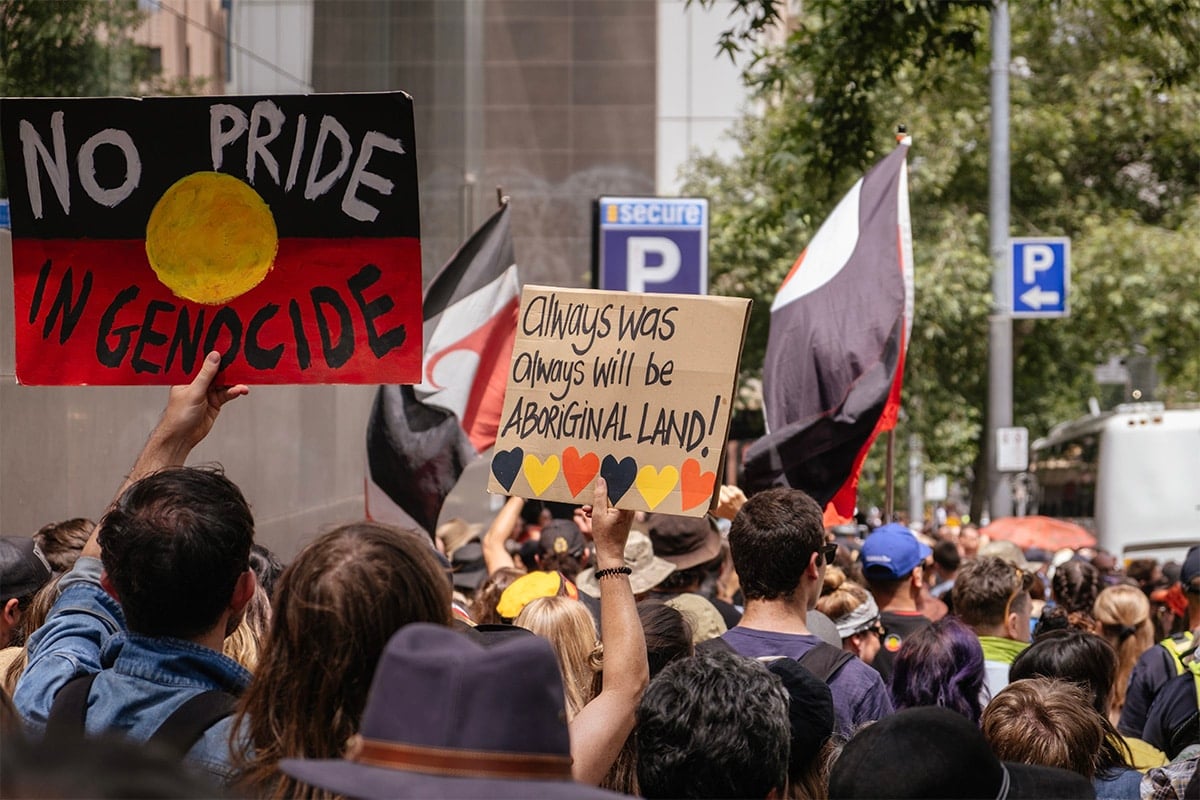
The Voice to Parliament Referendum has been defeated, with Australian states failing to reach a majority vote. The news broke just hours after polling booths closed across the country on October 14, reflecting the results of recent polls. It's a devastating conclusion to years of planning and months of campaigning, plain for the entire world to see. Understandably, First Nations leaders behind the Yes23 campaign have called for a week of silence following the result, which was announced via a statement released across the campaign's social media accounts.
It read, "Now is not the time to dissect the reasons for this tragic outcome. This will be done in the weeks, years and decades to come. Now is the time for silence, to mourn and deeply consider the consequence of this outcome."
"Much will be asked about the role of racism and prejudice against Indigenous people in this result," the statement continued. "The only thing we ask is that each and every Australian who voted in this election reflect hard on this question."
What is the week of silence?
As you may have gathered, the requested week of silence is to allow First Nations Australians the time and space to grieve this loss with community, in line with the belief that rest is a vital part of resistance. It will occur from October 14, for seven days and asks that media is respectful and complies with these wishes.
"We will not rest long," the statement furthered. "Pack up the Uluru Statement from the Heart. Fly our flags low. Talk not of recognition and reconciliation. Only of justice and the rights of our people in our own country. Things that no one else can gift us, but to which we are entitled by fact that this is the country of our birth and inheritance."
What other First Nations people have said
While some First Nations Australians are choosing to withdraw their commentary and mourn at this time, others are adamant that they will not allow their voices to be silenced, instead opting to air rightful anger, disappointment, and fears. Some of these statements can be found, below.
View this post on Instagram
View this post on Instagram
View this post on Instagram
View this post on Instagram
What causes should you be putting energy towards?
Whether First Nations Australians are opting to mourn in peace or continue to advocate and raise their voices, as an ally your work doesn't end with voting Yes. For practical ways to support and advance the causes of First Nations peoples, continue reading.
Donate
"Sisters Inside responds to criminalised women and girls' needs holistically and justly. We work alongside women and girls to build them up and to give them power over their own lives."
The organisation calls this 'walking the journey together'. Your donation (top right of website) will go towards a brighter future for Queensland's most disadvantaged and marginalised women and children.
North Australian Aboriginal Justice Agency
The Northern Territory focused NAAJA works to ensure Aboriginal peoples in the state have real access to Criminal, Civil and Family Law services. It works with Aboriginal communities, government and non-government stakeholders to deliver services in a professional, culturally proficient and community sensitive manner.
"After dispossession, new laws were imposed, and used to rule over our communities. We had no say in the laws that were created and the police and the courts have historically played a fundamental role in the oppression of Aboriginal peoples. The ALS was founded as a response to this injustice, and in acknowledgement of the importance of Aboriginal people designing and delivering services to our own communities."
The ALS was founded 50 years ago in Redfern, Sydney. Today it fights for the rights of Aboriginal and Torres Strait Islander Peoples in the areas of criminal law, children’s care and protection law and family law. Plus the development of wraparound programs (individual plans of care) and broader policy and law reform.
The National Justice Project advocates for the development of a law and a justice system which is fair, just and equitable. They provide legal support to people who struggle to access justice, with a focus on First Nations communities and asylum seekers. They receive no government funding, so donations are essential to the Project's efforts to advance human rights.
In Western Australia, people who have no criminal convictions can face prison if they are too poor to pay fines. And single Aboriginal mothers make up the majority of those affected. The Gofundme FreeHer – organised on behalf of Sisters Inside – is raising funds to release people from prison and help pay outstanding warrants.
Write to your state's premier to put pressure on government to raise the age of criminal of responsibility, which, in NSW currently sits at 10 years old. You can also sign the petition, and if you're looking for more information, watch In My Blood It Runs.
Since the Royal Commission into Deaths in Custody released their findings and recommendations in 1991, 516 Aboriginal and Torres Strait Islander people have died in custody. Write to your premier, sign the Amnesty International petition, and continue to follow the Kumanjayi Walker inquest.
Support Blak business
This is an ongoing way to demonstrate your support, and it's by using your money to support First Nations businesses. Here are some that we love to get behind. A friend recently shared, of all things, this Wiradjuri toilet paper company to subscribe to instead of Who Gives A Crap.
Photo by Johan Mouchet on Unsplash



